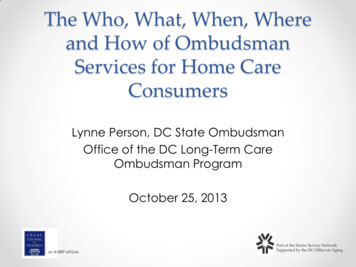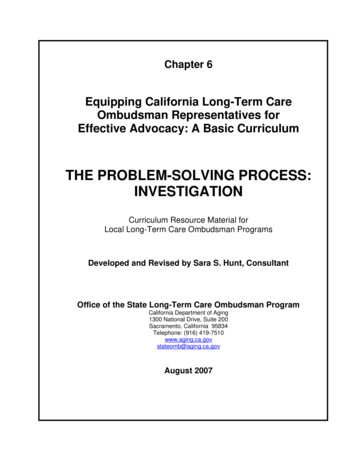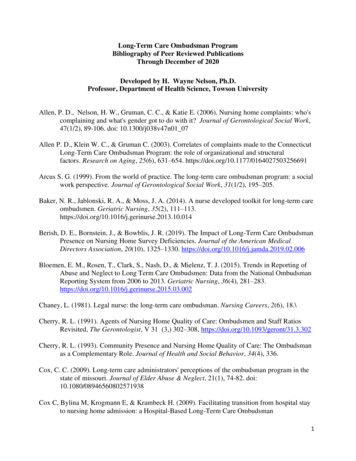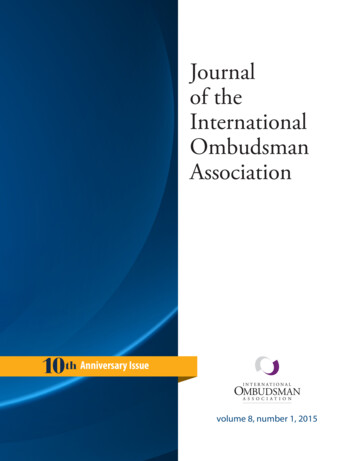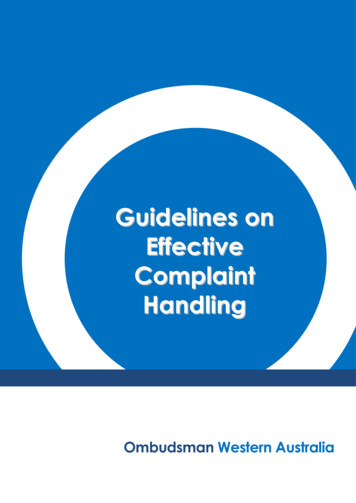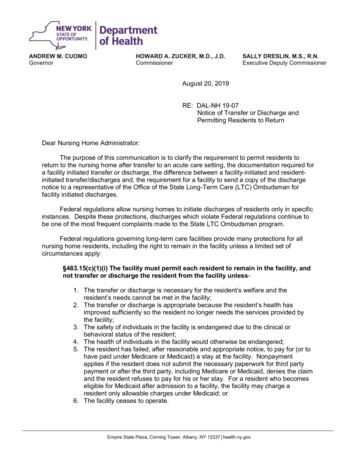
Transcription
newsissue70unsungheroesWalter Merrickschief ombudsmanLast month the consumer organisation Which?called us the ‘unsung hero of the world offinancial regulation’. But I want to point to somefinancial services practitioners who deserve a pat onthe back – those who serve on our industry liaison groups.When the Financial Ombudsman Service was first set up as a singlestatutory scheme, there was some concern that we might lose thetwo-way channel of communication provided by those practitionerswho had served on the boards of many of the former schemes. settling financialdisputes, not taking sidesin this issuea round-up of recentmortgage complaints 3ombudsman focus:overheard at our technicaladvice desk 12case studies illustratingsome recent pensionrelated complaints 15So we decided to set up three separate liaison groups – for insurance,banking and loans, and investment. We invited trade associationsto nominate members and to identify an individual from eachrelevant industry sector to chair the groups.ask ombudsman news24Each of these liaison groups has worked well over the lasteight years. They function as a useful forum – enabling industrypractitioners and senior representatives of the ombudsman serviceto exchange information and to update each other on current issues.Serving on these groups is not the stuff of great excitement,nor, I suspect, does it lead to recognition or promotion forthe industry members involved. Indeed, I wonder how manypractitioners across the financial services world are awareof the work these groups carry out. edited and designed by thepublications team at theFinancial Ombudsman ServiceWe hold the copyright to this publicationbut you can freely reproduce the text,if you quote the source. Financial Ombudsman Service Limited,reference number 436June/July 2008ombudsman news issue 701
No doubt there are ways in which their operations might beimproved – but in his recent review of the ombudsman service,Lord Hunt has suggested that they should be abolished andthat their functions could be transferred to the Financial ServicesPractitioner Panel and the FSA’s Smaller Businesses PractitionerPanel. These panels have heavy agendas, mainly concerned withthe work of the FSA. So I am not sure they would have room forour business. And, by their nature, these panels have to begeneralist in their approach.So the answer may, instead, be to bring more visibilityand transparency to the ombudsman’s industry liaison groups– by letting industry practitioners and the public see moreof their work.In the meantime thanks are due to those unsung heroes andheroines who serve – and have served – on these groups.Walter Merricks, chief ombudsman2Financial Ombudsman ServiceswitchboardSouth Quay Plazawebsite183 Marsh Wallconsumer enquiriesLondon E14 9SRtechnical advice deskombudsman news issue 70020 7964 1000www.financial-ombudsman.org.uk0845 080 1800020 7964 1400 (this number is forbusinesses and professional consumeradvisers only – consumers should ringus on 0845 080 1800)June/July 2008
case studiesa round-up of recentMany of the complaints we seeinvolving mortgages have arisenbecause of a difference between howcustomers expect their mortgage towork, and how it works in practice.Most people who take out a mortgagehave some idea how it operates.However, relatively few mortgagecustomers have much understandingof the technicalities. Without firstasking their lender, for example, manymortgage customers would be unableto say in detail exactly what practicaleffects a change in their mortgagearrangements would bring about.Because a mortgage loan is usuallyfor a large amount of money, quitesmall changes can – over time – makea significant difference in money terms.So mortgage customers can sometimesend up with a very unwelcome surpriseif they have not fully understood whatthe consequences of a change would be.June/July 2008This is even more likely to bethe case for customers who areexperiencing financial difficultyand have limited options.We are sometimes disappointed thatthe mortgage lender did not makegreater efforts to explain matters totheir customer when a problem orquery first arose.Even where lenders do attempt to explainmatters, we see cases where they havefailed to address an important point– or have given the customer anexplanation that was wrong. In a fairnumber of disputes it seems to us thatmore effective communication on thepart of the lender might well haveprevented the complaint from arisingin the first place. ombudsman news issue 703
case studiesI 70/1complained about the poor service shecustomer experiences difficultieshad received, the building society agreedobtaining explanation from lender aboutthat it had not dealt well with herchanges to her mortgageenquiries. It accepted her point that shewould have paid off the mortgage a yearShortly after her husband’s death,earlier – had it dealt with her queriesMrs C wrote to her building societyright away. It therefore refunded theabout her mortgage. She had taken thisinterest she had been paying on herout jointly with her husband some yearsmortgage over the past year. It also madeearlier, and was now thinking of payinga separate refund of interest totallingoff the remaining balance.almost 700 and gave her 200 for theinconvenience it had caused her.The building society kept Mrs C waitingsome while before it responded to herHowever, Mrs C still felt uneasy aboutletter and she was totally confused bythe situation because the building societythe information it sent her. After makinghad never explained exactly what hadfurther enquiries, she was surprisedhappened to the mortgage. She thereforeto discover that – at some point – thebrought her complaint to us. She saidbuilding society had changed the basisshe had serious doubts about the wayon which the mortgage was set up,the mortgage had been administered.transferring it from interest-only toShe also told us she thought the buildingcapital and interest.society had a general policy of alteringmortgage arrangements without itsMrs C had been quite unaware that therecustomers’ knowledge.had been any change to the mortgage.She asked the building society to explaincomplaint upheld in partexactly what had happened, but despiteThe building society’s records for thesending several further letters shemortgage account showed that it hadencountered considerable difficultiestransferred the mortgage from anin getting any more informationinterest-only to a capital and interestbasis around a year before Mr C’s death.Mrs C eventually paid off the remainingmortgage balance, having by then beenWe noted that, a few weeks before thein correspondence with the buildingchange had been made, Mr and Mrs Csociety for almost a year. When shehad written to the building society aboutone of the endowment policies4ombudsman news issue 70June/July 2008
case studies. she was totally confusedby the information the buildingsociety sent her.The building society offered to payMrs C an additional 200 for theinconvenience it had caused her. We toldher we thought this represented a fairoutcome and we recommended thatshe should accept the offer.supporting their mortgage. That policywas reaching the end of its term andI 70/2we thought the mortgage arrangementconsumers hand back their househad probably been changed afterto their lender but are not told theythe building society misinterpretedremain responsible for any outstandingwhat the couple said about the policymortgage arrearsin their letter.Mr and Mrs A had been in financialOur investigations enabled us to reassuredifficulty for some while and had fallenMrs C that the building society did notseriously behind with their mortgagehave a general policy of transferringrepayments. They had been trying formortgages without their customers’nearly a year to sell their house – or toknowledge, as she had feared.rent it out – but had no success.We explained to Mrs C that she had,Accepting that they had little realisticin fact, benefited from the change.prospect of repaying the mortgageAlthough the monthly payments hadarrears, they resigned themselvesincreased, they had still been easilyto giving up their home. They handedaffordable. And the higher repaymentsin the keys to the building societyhad the effect of slightly reducing theand moved in with Mrs A’s mother.balance on the loan – something thatJune/July 2008would not have happened if the basisJust over two years later, a friend ofof the mortgage had remained the same.the couple told them he had seen theirMrs C had also been paying less interestformer home listed on a propertysince the change. Until we pointed thesewebsite. The house appeared to havethings out to her, Mrs C had not realisedbeen sold in the past couple of months.that there had been any positive aspectsWhen Mr and Mrs A contacted theirto the situation.building society it confirmed that the ombudsman news issue 705
case studies. they thought theirresponsibility came to an endwhen they handed back thekeys of their house.sale had gone through very recently.However, it told the couple that theproceeds of the sale had not covered allof their mortgage debt – so they stillowed the building society 6,300.Mr and Mrs A were alarmed by this news,as they had thought their responsibilityfor the arrears came to an end whenthey handed back the keys of their house.They said it was unreasonable of thebuilding society to expect them to paythe outstanding amount. In their view,the house should have attracted a highenough price to pay off all theoutstanding debt. They said it was thebuilding society’s fault that this did nothappen – because it had taken so longto put the house up for sale.The couple were also concerned that thebuilding society had not kept theminformed about the sale of the property.They said they thought it ‘very suspicious’that they had not been asked to sign anypapers relating to the sale.6ombudsman news issue 70June/July 2008
case studiesUnable to resolve matters with thestop once they handed in the keys. Theybuilding society, Mr and Mrs A referredhad also expected the building society tothe dispute to us.contact them and obtain their signaturesbefore selling the house. We explainedcomplaint upheld in partthat handing in the keys to a mortgagedThe building society was unable toproperty does not, of itself, stop interestexplain its delay in putting the propertyaccruing on the mortgage account.on the market. However, we were satisfiedWe also explained that as they hadfrom the evidence that, once it set outhanded back their house voluntarily, theto sell the house, it had obtained properbuilding society had not been obliged tovaluations and had achieved the bestget their signatures on the sale papers.price reasonably available at the time.But we agreed with Mr and Mrs A that theIn the particular circumstances of thisbuilding society should have kept themcase, we could not see that Mr and Mrs Ainformed about the sale. And we thoughthad been caused any loss. There wasthe building society should have takennothing to back up their view that themore trouble to ensure they fullybuilding society would have got a higherunderstood the implications of handingprice by selling the house right away.back the keys of their house. It wasThe house had been on the market forunlikely that this would have madeover a year by the time the couplethe couple alter their plans. But it woulddecided to hand in the keys. The fewat least have spared them someoffers they received in that time had beenof the surprise and dismay they feltvery disappointing and – if they hadwhen they were subsequently askedaccepted any of them – they wouldto repay the shortfall.probably have been left with a shortfall,after the sale, of around 13,000.We did not agree with Mr and Mrs Athat the building society should takePart of Mr and Mrs A’s dissatisfactionresponsibility for the shortfall. But westemmed from their assumption that thearranged for the building society tointerest on their mortgage debt wouldreinstate its offer of an interestconcession, which Mr and Mrs AJune/July 2008 ombudsman news issue 707
case studies. the lender’s letter didnot explain the figures as well asit might have done.had refused when the building societyAfter receiving her next mortgagehad first suggested it. We said that thestatement, Miss G contacted her lenderbuilding society should also reduce theto complain. She said it had ‘overchargeddebt by 300 to compensate Mr andfor interest on the January overpaymentsMrs A for the inconvenience causedof 1,501.79’, with the result that herby its poor communication.monthly repayment from February wasmore than it should have been.complaint not upheldI 70/3We looked carefully at what Miss G’scustomer misunderstands calculation ofmortgage agreement said aboutinterest on overpayments made to heroverpayments. This clearly stated that,mortgage accountfor interest purposes, monthlyoverpayments took effect from the firstThe terms and conditions of Miss G’sday of the following month, while interestmortgage allowed her to make additionaltook effect immediately on largercapital repayments of up to 500 eachoverpayments that were made annually.month – without incurring any charge.She was also able, each January, to makeWe were satisfied that the lender hadone additional capital repayment of attreated Miss G’s payments in Januaryleast 1,000 – again without charge.2008 correctly; her overpayment of 1,000 reduced her interest immediately.In January 2008 she decided to make anThe problem seemed to stem from herextra capital repayment of 1,000mistaken assumption that the total– and on 16 January she sent her lenderamount she had paid in January was ana cheque for this amount. On 30 Januaryoverpayment. In fact, the payment ofshe made her normal monthly repayment 501.79 was simply her regular monthlyof 501.79 by direct debit.8ombudsman news issue 70June/July 2008
case studiesrepayment, which did not qualify forsupporting their mortgage had been setspecial interest treatment.up for a 20-year term. The mortgage itselfhad been arranged with a 25-year term.We explained this to Miss G and sent hera simple calculation to show that theMr and Mrs W wrote to the lenderinterest had been treated correctly andcomplaining of ‘mis-selling’, on thethat the balance carried forward on hergrounds that the terms of the mortgageaccount for February 2007 was correct.and of the endowment policy did notThis had been shown on her annual‘match’. The lender’s response focused instatement in March 2007, but we did notsome detail on why it did not think anythink that the lender’s covering letter,mis-selling had taken place. However, itsent with the statement, explained thefailed to address the couple’s specificfigures as well as it might have done.concerns about the length of the loan notAnd unfortunately the lender’s‘matching’ that of the endowment policy.subsequent correspondence with Miss GThe couple remained worried about thisfailed to explain the situation clearlyand, unable to obtain any moreenough to reassure her and settleinformation from their lender, theymatters at that stage.eventually brought their complaint to us.At the time the mortgage had beenset up there was no requirementI 70/4for mortgage lenders to keep detailedcustomers complain of mis-sellingrecords. The paperwork suggested thatbecause their mortgage loan has aMr and Mrs W had probably asked for thelonger term than the endowment policy25-year term, but there was no indicationset up to repay itof whether the lender had discussedthis with them.Ten years after taking out an interest-onlymortgage supported by an endowmentBut regardless of why the terms of thepolicy, Mr and Mrs W unexpectedlymortgage loan and the endowment policyinherited some money and decided todiffered, the main point as we saw it waspay off their mortgage.that the difference had not disadvantagedMr and Mrs W in any way. They paid onlyJune/July 2008When they checked through theirthe interest on their loan, so their monthlymortgage paperwork they were alarmedrepayments would have been the sameto discover that the endowment policyno matter what term they chose. ombudsman news issue 709
case studiesAnd the endowment policy was well ontrack to produce enough – at the end ofits 20-year term – to repay theoutstanding mortgage loan.We explained all of this to Mr and Mrs W. frustrated by thebank’s apparent inabilityto explain matters, she madea formal complaint.and told them that as they had notsuffered any loss or damage we did notthink we should investigate any further.Reassured by our explanation, the coupleagreed that they had no need to pursuethe complaint.Mrs M decided to stop making anymortgage repayments for a while. Shereasoned that the bank would be able toI 70/5take her monthly repayments from thebank fails to provide clear explanationaccumulated overpayments she had beenwhen customer queries mortgagemaking over the years. When this ‘fund’balance after temporarily stoppingstarted to run out – the bank wouldher monthly repaymentspresumably let her know and she wouldthen start making repayments again.Mrs M had a mortgage from her bankand, because she was easily able toMrs M assumed that, until she resumedafford it, she had for many years beenthe repayments, her mortgage balancemaking a significantly larger repaymentwould effectively stay level – to reflecteach month than the scheduled amountthat fact that she had ‘stored up’she was contracted to pay.so many payments in advance. She didnot mention her plan to the bank.When she was in a branch of the bankone day, withdrawing some cash,A few weeks after deciding to stop herit occurred to her to ask how far aheadmonthly payments, Mrs M received hershe was with her mortgage. She wasannual mortgage statement. She had notold she was ‘about ten years aheadfurther contact from the bank about herwith payments’.mortgage until she received the nextannual statement. She was concerned10ombudsman news issue 70June/July 2008
case studiesto discover from the statement thatShe had made certain assumptionsher mortgage balance had increased.about what would happen to herShe could not understand this andmortgage if she stopped makingthought the bank must have madepayments. Unfortunately, she hada mistake.never checked with the bank that herassumptions were correct. So we did notWhen she contacted the bank to askthink the bank could fairly be responsiblewhat had happened, it sent her somefor the fact that things did not go ascalculations which made no sense to her.she had expected.She asked for an explanation and thebank wrote to her again. However, it stillHowever, we agreed with Mrs M that thefailed to explain why her balance hadbank had not dealt adequately with herincreased. Mrs M contacted the bank yetqueries. It had failed to give her a clearagain. This time she was simply told thatexplanation about the increase in thethe situation could have been avoidedmortgage balance – and its referenceif she had asked for a formal ‘paymentto a ‘payment holiday’ had not helpedholiday’ to be set up on her account.her understanding of the situation.Frustrated by the bank’s apparentWe explained to Mrs M that although theinability to explain matters, Mrs M thenextra payments she made could be usedmade a formal complaint. She said thatto meet future payments as they fell due,the bank should have taken more troublethis did not stop interest being chargedto offer her advice about her mortgageon the balance of the account in theoverpayment – and she believed therenormal way. So the mortgage balancewould have been no increase in herincreased over time even though she wasbalance if it had done this.always ahead with repayments. A formalpayment holiday arrangement would notcomplaint upheld in parthave made any difference.Mrs M had not asked the bank how best tomanage the overpayment on her mortgageWe said the bank should pay Mrs Taccount. And she had not sought its advice 100 to reflect the inconveniencebefore deciding to stop her payments.it had caused her by its failure toIn the circumstances, we did not considerexplain matters properly.the bank was under any obligation tooffer her advice on its own initiative.June/July 2008ombudsman news issue 7011
ombudsman focustechnical advice deskThis month’s ombudsman focus provides a round-up of some of thequestions put to our technical advice desk recently about changes tothe dispute resolution (DISP) rules.I run a small financial services business.prescriptive – but the basic process remainsI hear that the dispute-resolution (DISP) rulesthe same. You must still publish details ofhave been updated. Is that right?your complaints-handling process (includingYes. Updated rules about how you deal withaccess to the ombudsman service) and makecomplaints in-house (DISP 1) came into forcethis available around the point of sale.on 1 November 2007 – with a couple of minorBut you no longer have to displayamendments following on 6 July 2008.a notice saying you are covered by theUpdated rules describing the ombudsmanombudsman service.service’s jurisdiction (DISP 2) and ourprocedures (DISP 3) came into force fromI hope my business never receives a6 April 2008.complaint, but what changes are thereif I do receive one?who updated the rules and why?You must still send the consumer anSome of the DISP rules are made by the FSA.acknowledgement and provide a copy of yourThe others are made by the ombudsmancomplaints-handling process, but the rulesservice, and approved by the FSA. We workednow require you to do this ‘promptly’ rathertogether on the changes, which werethan within a set time of 5 days. And the rulesdesigned mainly to make the rules shorternow require you to keep the consumer(by about 30%) and easier to understand.informed about your investigation of theThe DISP 1 rules also take account of thecomplaint, rather than requiring a letter at theEuropean Markets in Financial Instruments4-week stage.Directive (MiFID), but that only affects crossborder branches doing investment business.have the rules about written responsesand final responses to consumer12well, mine is just an ordinary businesscomplaints changed?(with no cross-border branch) – so how doThe rules about responses remain largely thethe updated rules affect me when I’m dealingsame – though you can no longer getwith complaints?consumers to settle on the basis of an interimYou will find the rules easier to read, and lessresponse without telling them about theombudsman news issue 70June/July 2008
Financial Ombudsman Service. And, whereassignment (as before) but also whereresponses are required to mention thethere is an equitable assignment.ombudsman service, this must now be in theSecond, the position on third parties hasletter itself and not just in an enclosed leaflet.been clarified; under the rules, third partiesinvolved in motor accidents are not nowhow have the rules on the ombudsmaneligible complainants.service’s jurisdiction in DISP 2 changed?Again, you will find the rules easier to read –are the time limits still the same?and they are set out in a new order.There have been no changes in the timeFirst, they explain which business activitieslimits for referring a complaint to theare covered by the ombudsman service (byombudsman service.type and where they are carried on);then, which consumers are eligible to complain;so are there any changes in DISP 3, the rulesand finally, the time limits which apply.about the ombudsman service’s procedures?The overall procedures remain basicallyare the business activities covered still thethe same, but the opportunity has beensame as before?taken to clarify a few points on whichThere is no change to the activities coveredsome businesses (and some consumers)by our compulsory jurisdiction and thewere unclear.consumer credit jurisdiction (which applyautomatically to FSA-regulated firms,what sort of points do you mean?businesses with standard consumer-creditWell, consumers sometimes get confusedlicences and to former firms and licensees) –about who their complaint is against –though the rules clarify that ‘ancillaryespecially where a couple of financialbanking services’ include foreign exchange.businesses are involved, for example aninsurance broker and an insurance company.There is a change for the voluntaryThe new rules make it clear that thejurisdiction (which some businesses chooseombudsman service can point the consumerto join). This has been extended to cover alltowards the correct business.activities directed at the United Kingdom fromelsewhere in the European Economic Areathat seems sensible – but what if a singlewhich would have been covered by theconsumer’s complaint genuinely involves twocompulsory jurisdiction or consumer creditbusinesses?jurisdiction if carried on from the UK.In that case, the new rules clarify that we canlook at both aspects of the case through ahave there been any changes to the types ofsingle investigation, though we will still issueconsumer who are eligible to complain?a separate decision in respect of eachThese remain the same except in two cases.financial business. And, where appropriate,First, the assignee of an insurance policywe can apportion the consumer’s loss betweenis now eligible not only where there is a legalthe businesses which contributed to it.June/July 2008 ombudsman news issue 7013
is there anything else?Where appropriate, an ombudsman can hold ato deal separately with each of the partnershearing by phone. And, in line with partnershipin a partnership – one partner, on behalflaw, the rules confirm that we are not requiredof the partnership as a whole, suffices.%useful linksThe rules are at http://fsahandbook.info/FSA/html/handbook/DISPThe changes are explained in policy statements icy/2007/07 09.shtml(most of the DISP 1 y/Policy/2008/08 03.shtml(mainly the DISP 2 and 3 changes – including, in annex 3, a summary of the mainchanges and tables reconciling the old rules with the new).Our technical advice desk answers a wide range of queries from financial businesses andconsumer advisers about the ombudsman service and how we operate – including providinginformal assistance on the ombudsman’s approach to particular topics.You can call the technical advice desk on 020 7964 1400 or emailtechnical.advice @financial-ombudsman.org.uk14ombudsman news issue 70June/July 2008
case studiesI 70/6consumer complains of being wronglyIn its response, the firm said that Mr Badvised to contract out of SERPShad been below the ‘pivotal age’ at thetime of the advice, and had been earningIn 1990 Mr B contacted the firm forenough for it to be reasonably confidentadvice about saving for his retirement.that contracting-out was suitable for him.He was aged 35 at the time and earning 18,000 a year. The firm told him heThe firm also said that when Mr B tookshould contract-out of the State Earningsout the policy he would have been sentRelated Pension Scheme (SERPS) andvarious policy documents, including anmake regular contributions to a personalexplanation that the pension benefitspension policy.were not guaranteed. Unhappy with thisresponse, Mr B asked the claimsAs the years went by, Mr B becamemanagement company to bring theincreasingly concerned about his pensioncomplaint to us.arrangements. Towards the end of 2007he asked a claims management companycomplaint not upheldto complain to the firm on his behalf.When considering whether it was suitableThe complaint centred on the firm’s advicefor a consumer to contract-out of SERPS,to contract-out of SERPS, which Mr Bfirms typically applied a ‘pivotal age’.considered to have been unsuitable.The idea was that consumers belowHe said the firm had not considered histhat age could find it beneficial toattitude to risk, or warned him that thecontract-out. There was a reasonablevalue of the pension he would get fromexpectation that the value of anythe policy was not guaranteed.National Insurance rebates, tax-reliefand government incentive obtained bycontracting-out would be greater than thevalue of the SERPS benefits given up. June/July 2008ombudsman news issue 7015
case studiesFor consumers above the pivotal age,I 70/7there was less time for investmentwhether firm calculated appropriate levelgrowth and therefore a greater risk thatof redress for pension mis-sellingthe consumer would be worse off thanif they had stayed in SERPS.In 1988, Mr J was working for C Ltd andwas entitled to join its final salary pensionWhen considering the suitability ofscheme. However, after consulting a firmcontracting-out, firms also needed toof financial advisers he took out aconsider the consumer’s earned income,personal pension instead.as the rebates and other amountsreceived when contracting-out wereLater on, the firm started to assess thebased on that income. People on loweradvice it had given Mr J – as it wasincomes received lower rebates, if any,required to do as part of the industry-wideand the charges they would have to paypension review. When it contacted Mr Jon a personal pension policy would havein connection with the review, he asked ita greater impact.to postpone work on his case. He wasaware that the review could result in hisIn this instance, we agreed with the firmreceiving redress – and he was anxious tothat Mr B had been below the pivotal ageavoid any increase in his assets while hewhen he was advised to contract-out, andwas going through divorce proceedings.his earnings had been high enough tomake contracting-out worthwhile. ThereIn 2006 Mr J took up a job with the Civilwas clear evidence that the firm hadService and joined its pension scheme.properly considered Mr B’s attitude toBy then he was divorced and he askedrisk. We were satisfied that the firm’shis financial adviser to complete itsadvice had not been unsuitable and hadwork on his case.not exposed Mr B to a de
2 ombudsman newsissue 70 June/July 2008 switchboard website consumer enquiries technical advice desk 020 7964 1000 www.financial-ombudsman.org.uk 0845 080 1800 020 7964 1400 (this number is for businesses and professional consumer



